
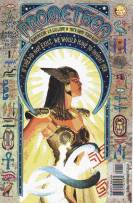
June 2 1999...August 1999
2 pgs of text + 32 pgs.



Both covers paraphrase the same quote which originally comes from Voltaire
"If God did not exist we would
have to invent him"
If anyone is interested in trying to decipher the
hieroglyphics that occur in various places here is the Hieroglyphic
Alphabet
Claire Jordan points out that
the spiral-ish pattern
partway down the righthand side, just above the Greek helmet, is a Troy (a.k.a.
Troi, Troy-Maze or Walls of Troy). This is an ancient (Bronze Age to Mediaeval)
European meditation-aid - a sort of one-way maze, originally set out in low
earth ridges, and later inlaid into mosaics on church floors (I believe there's
one in Notre Dame). It's not a sort of maze you can get lost in: instead, you
follow the lines very precisely, one foot in front of the other, and it takes
you weaving back and forth within a very narrow space - so it could take 20
minutes to get to the centre of one only 10 feet across. The effect is hypnotic
and I believe it was seen as a sort of mini-pilgrimage. You can either draw the
line you walk, or the barriers which surround the line you walk


TITLE:
The Radiant Heavenly City could refer to Revelations
Chapter 22
SYNOPSIS
In Alexandria in 411 AD Promethea's father, a hermetic
scholar and magician, is killed by a mob of Christians just after he sends her
off into the desert to save her. There she meets 2 of her father's gods
Thoth-Hermes who rescue her by taking her off into the Immateria where she will
no longer be just a little girl but a story living eternally.
In New York in
1999 AD Sophie Bangs is working on her term paper about Promethea a fictional
character who has appeared in 18th century poems, newspaper strips, pulp
magazines and comic books. Her friend Stacia goes to a rock concert while she
tries to interview Barbara Shelley, the widow of the last person to write
Promothea comic books, but is promptly ushered out.
New York's resident
science heroes the Five Swell Guys find her and ask if she is being menaced by
anybody but at the time she feels safe.
Shortly after a Smee (or
Semi-Mindless Elemental Entity) tries to kill her but she is rescued by Barbara
who has turned into Promethea. Hiding from the Smee Barbara explains about
Promethea and how Sophie can become her just by writing about her. When the Smee
returns to attack again Sophie has managed to turn into Promethea and just about
kills it but Margaret has been wounded and Promethea flies off with her to
taking her to a hospital.
QUOTES
"There is no point. That is the genius of Weeping Gorilla" -
Stacia pg. 5
"You don't wanna go looking for folklore and you especially
don't want folklore to come looking for you" - Barbara Shelley pg. 7
"No
extraterrestrial creatures bothering you? No government conspiracies, ancient
demonic cults, nothing like that?" - Bob from the 5 swell guys, pg. 10
"What
did I do? I haven't done anything. I'm a college student. All I ever did was
read books. What did I do?" - Sophie
"Wrong Books" - Smee pg. 13
"Is your
world very far?" - Promethea(0)
"No. It is always in the place where you are
standing" - Hermes. pg. 21
"A Smee is a Semi-Mindless Elemental Entity.
It'll probably rape, kill and disembowel us. Maybe even in that order" - Barbara
pg. 23
"I am Promethea, art's fiercest spark...I am all inspiration...all
desire. Imagination's blaze in mankind's dark..I am Promethea.. I bring you
FIRE!" - Promethea(6) pgs. 27-28
NOTES & ANNOTATIONS
The Promethea Puzzle: An
Adventure in Folklore
Two other of Alan Moore's ABC titles Tom
Strong and Top Ten also began with 2 page introductions densly packed
with background details.
In the original comic book this 2 page introductory
article was placed after the comic book itself but in Book One it is placed
before the illustrated chapters. The interesting thing here is that Alan Moore
manages to give the reader so much background detail without actually giving the
plot away. Here he manages to intermix real people with totally fictitious ones
in a very convincing way
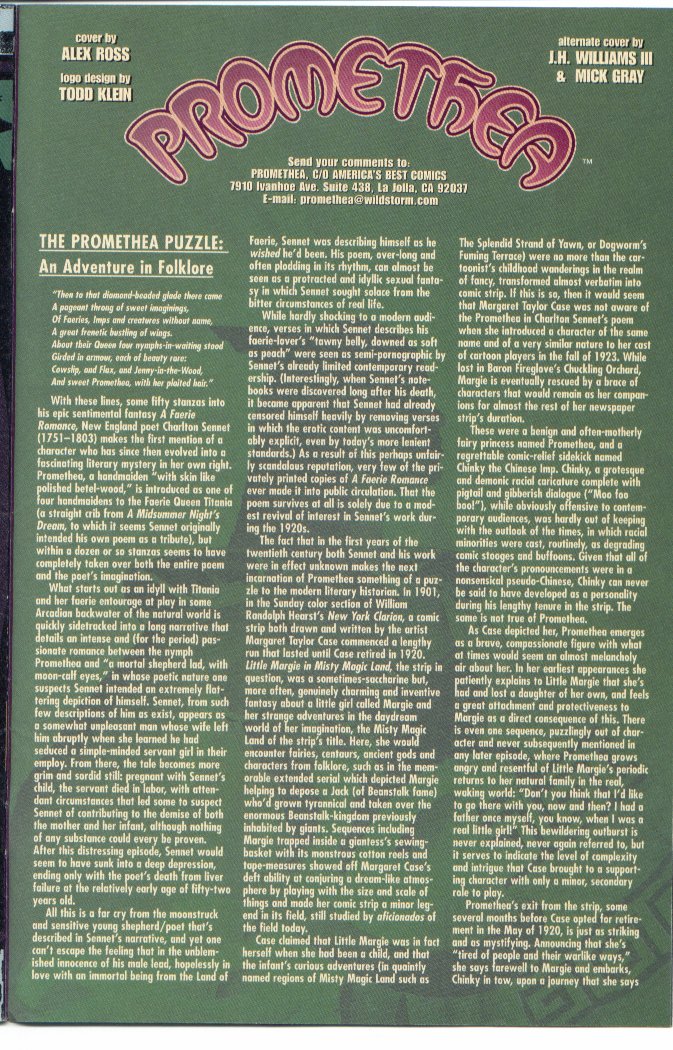
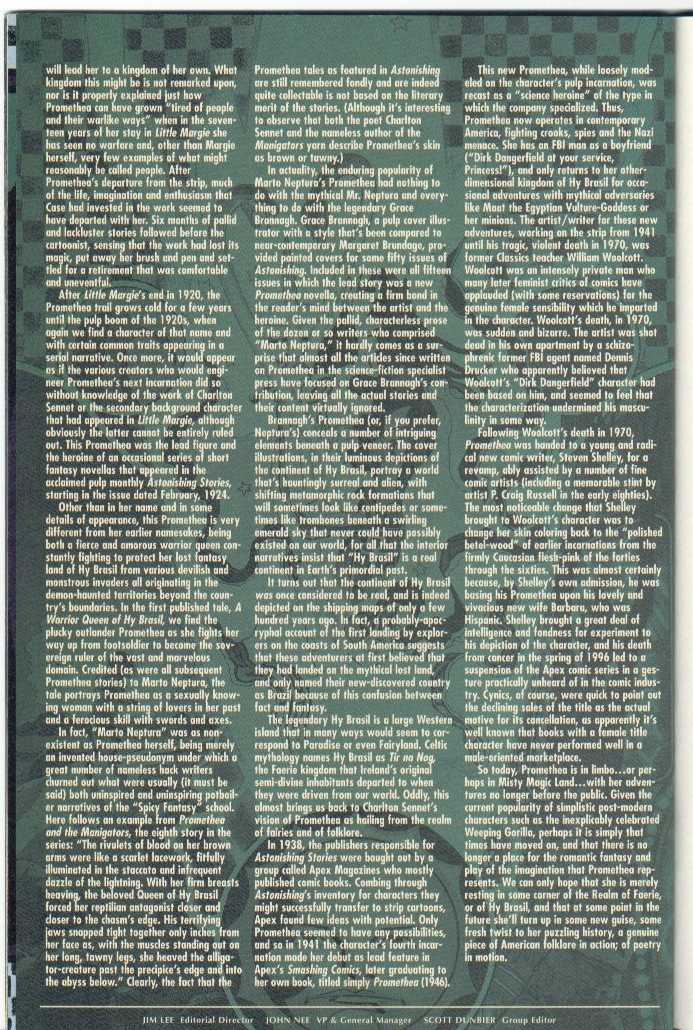

Part of the script for this page can be found here
Caption:
411 A.D. - two important events that occured this year, both concerning the
Roman Emperor Constantine III, were his conversion to Christianity in a bid for
sanctuary and his subsequent execution.
Also in this year (or thereabouts)
St. Augustine preached the following sermon.
Page
1, Panel 4: Note the little statues of Hermes and Thoth at each end of the
desk.
Promethea's father appears to be translating Egyptian hieroglyphics
(paper on left) into another language (perhaps Greek)
Page 1, Panel 5:
"They are coming for me, as they came for beautiful Hypatia" - presumably
Hypatia is the name of Promethea's mother. If so she might be this Hypatia
Note
the caduceus leaning
on the wall behind little Promethea.
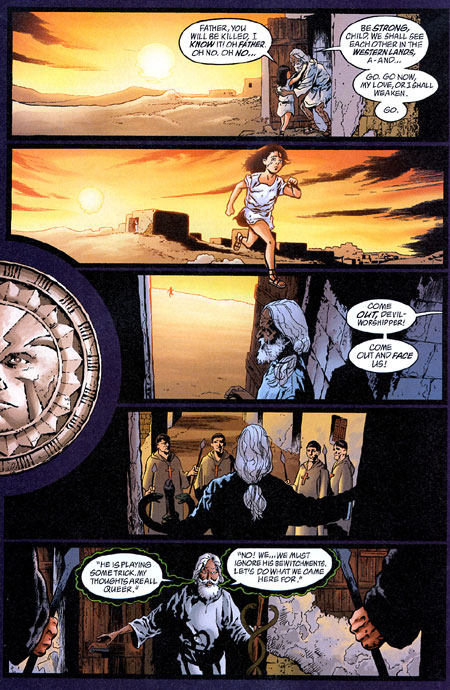
Page 2, Panel 1 "We shall each other in the Western Lands" -
yes they will but we have to wait until Issue #19 before
that happens.
Panel 3: Devil worshipper would have been a
common taunt made by Christians against any pagans at this time
Page 2,
Panel 5 & Page 3 I'm not sure why Promethea's father speaks the dialogue
of the 5 christians just before they do. It reminds me a bit of Obi-Wan Kenobi
in the first Star Wars film but there he was using mind control and I don't
think Promethea's father wants to be killed.
Marc William de Giere points out
that
I see it as he knows his fate and accepts it, even facilitates it.
This doesn't mean he "wants" to die, he just is aware of what he must do for
Promethea and her story to begin. Very much like Jesus sacrificing himself.
Remember, he is smiling.

Page 3, Panels 2 & 5: "the radiant, heavenly city" is most
probably a reference to Revelations
Chapter 22
Page 4: Caption 1999 A.D. - the year Promethea was
first published.
Prostitutia and Prosthetica: two
mispronunciations of Promethea by Stacia. There will be quite a few more later
on
I don't think I need to explaing what a prostitute is
Prosthetic
means
Serving as or relating to a prosthesis.
Of or relating to
prosthetics
and a prosthesis is
An artificial device used to
replace a missing body part, such as a limb, tooth, eye, or heart valve.
Replacement of a missing body part with such a device
Defintions
taken from Dictionary.com
The
House seen above the giant poster on Level 9 could be Moore's house of Magic
seen on the last page of this issue
The two flying saucers numbered 12 and 4
could be police. They are both shining beams on a person standing on
L2
NUKOLA ad
Not sure what PXXX stands for
The chequerboard pattern
seen on the left can also be seen on the Cab
The T on top of the cab must
stand for Taxi
Note that the sun image has its' eyes closed on pages with
Sophie and it is not until she turns into Promethea towards the end of this
issue that the sun image has its' eyes open
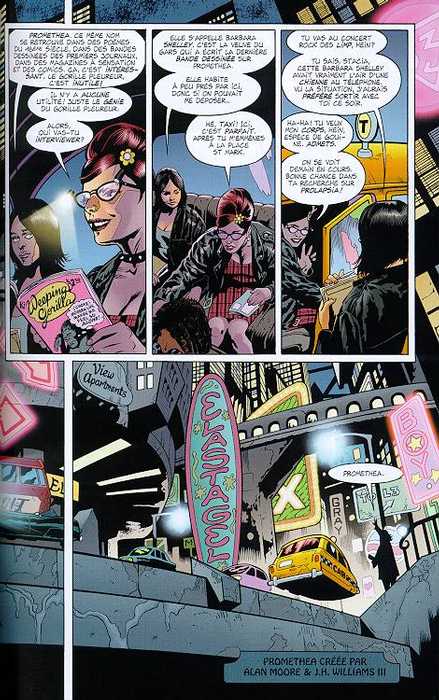
Page 5 Panel 1: Note the small lights on the frame edges of Stacia's
glasses. The right one is turned on to make it easier to read in the
dark.
Panel 3: Prolapsia another mispronunciation from
Stacia
A prolapse comes from
[L. prolapsus, fr. prolapsus, p. p. of
prolabi to fall forward; pro forward + labi to glide, fall.] (Med.) The falling
down of a part through the orifice with which it is naturally connected,
especially of the uterus or the rectum. --Dunglison
Panel 4: Sign
reading View Apartments.
Elastagel sign. First mention of Elastagel which
will be prominent in the plot in issue #11.
GRAY
sign for inker Mick Gray
Not sure what BOY with a star in the O is a
reference to
Marc De Giere notes that
The "Gray" sign could also be a
reference to Grayshirt, which has a cover title that looked very similar. The
"boy" sign could refence the issue 7 romance.
Just under the arrow pointing
upwards to L3 sign and behind Sophie's silhouette what looks like a pepsi
sign
Page 6: "I'm Sophie Bangs" - In Issue 14 we will
learn of a writer with the surname of Bangs whom Sophie is related to. I was
always kinda hoping that she might also be related to the rock music critic Lester
Bangs,
(immortalized in the lyrics to the REM
song It's the end of the world as we know it
"Leonard Bernstein. Leonid
Breshnev, Lenny Bruce and Lester Bangs.")
but it hasn't happened
yet.
Pages 6-7 a lot of background history complementing what we have
been told in The Promethea Puzzle can be found here. See also pg.
22
Nice effect of spiral staircase to the left and right of the framed
panels.
Page 6 Panel 2: Note the picture on the wall appears to have
the same solar face seen throughout this issue and even on these pages.
The
police Flying saucers are also seen outside the window.
Panel 3: Looks
like a silhouette of Batman on the first small picture on the wall
Panel
4: Note the sad teardrop effect created by the rain outside the
window
This is the only panel viewed from outside the apartment
Page 7
Panel 1: Just one police flying saucer seen outside the window this
time
Pages 8-9: In all of the Alexandria 411 AD panels the sun's eyes
are open
Page 9, Panels 1-3: The creature might be a salamander.
Thanks to Marc de Giere for the following information
The first thing I
thought of when I saw the creature was a salamander, as it is referenced to a
lot in religious writings. This information comes from here:
It
was considered the "king of fire" and as such was representative of Christ who
would baptize with the flames of the Holy Spirit and who surprized his followers
by warning, "I have come to send fire on the earth, and how I wish it were
already kindled! Do you suppose that I came to give peace on earth? I tell you,
not at all, but rather division." [Lk 12:49 & 51]William of Normandy called
the salamander the symbol of the 3 Hebrew children who survived the fiery
furnace. [Dan 3] The salamander can also represent the 4th man seen in the
furnace who promised, "When you pass through the waters, I will be with you
...When you walk through the fire, you shall not be burned, nor shall the flame
scorch you." [Is 43:2] Cloquet considers Christ the salamander king of fire
because He passed through the fires of hell after His crucifixion without harm.
The salamander represents those who pass through the fires of passion and of
this world without stain. Therefore, it stands for chastity, loyalty,
impartiality, virginity, courage, Jesus, Mary, and the faithful. The salamander
is also used to symbolize the flames which it passes through and so is a symbol
of fire, temptation, and burning desire.

Page 10 Panel 1: Sophie is on L2 here
Page 10, Panel 2:
First appearance of the 5 Swell Guys, New York's resident Science Heroes.
Kenneth is obviously having some problems coping with his recent divorce and his
psychic abilities leave much to be desired (or do they?).
Page 11 Panel
2: ON! sign and beside it L7. (Note that L7 is somestimes used as slang for
"square" as in un-hip in contrast to C-Moon which is a circle)
Panel
5: Our first view of the Smee
Page 12 Panel 1: L25 should really
be L2.5
Page 12, Panel 2: It's a bit dark but note that on the poster
for The Limp just behind Sophie a hand is reaching out for her just as the Smee
will do in another few panels.
Panel 5: Nice lettering on the Smee's
speech bubbles
Panel 8: Sophie drops most of her notes
Page 13
Panel 8: Signs visible include Weeping Gorilla Comix and The Devil
(Apartments?) next to a Piz(za?) place
Pages 14-15: (L)OVE (C)LUB and
(G)od's Store also ...INESE ...KE ...IT (probably CHINESE TAKE OUT) and Hong
Kong and Gir(l)s and Fantasi. Goldberg's (Apartments)
Page 16, Panel
1: Weeping Gorilla is published by the Apex Publishing Co.
Page
17: Looks like Promethea can punch the Smee and leave a gap in his body
without affecting him too much
Smee says "Open you like a fish..." and then
on the first panel of page 19 we see a fish sign on the right.
Page
19: After all the excitement of the last few pages the panels return to
normal once again
Pages 20-21: Nice effect of both Hermes and Thoth
speaking in unison with their combined speech bubbles surrounded by squiggles
including the female
or Venus sign
The Gods are so bright that even during night-time it is as
bright as day around them
Page 22 More background history. Now Barbara
is telling Sophie the story instead of vica-versa as on pgs 6-7. On the right
hand side we can see all the persons who brought through the previous
Prometheas: Charlton Sennet, Margaret Case, Grace Brannagh, William Woolcott and
Steve Shelley.
They channelled Promethea
Channeling is defined
as
The act or practice of serving as a medium through which a spirit guide
purportedly communicates with living persons
according to Dictionary.com
Here is a
fuller definition of Chanelling and here is a list of channeling links
At the
bottom right hand side is Charlton Sennet with Promethea. Bottom left Promethea
appearing to a soldier during WWI and top left little Promethea with a centaur.
Note
the little pink fairies flying in the air and the little green men on the ground
(the one with his back to us has a tail and might be a demon of some kind). Also
note that there appear to be two suns in the sky
Page 23, Panel 1:
From Promethea/Barbara's point of view we see Sophie. Note that she is still
Promethea in costume with sandals on her feet
Panel 2: One leg has
jeans and the other Promethea's skirt. She is starting to transform back to
Barbara
Panel 3: She is now back to being just Barbara
"Steve had
the imagination. He died, '91" - Barbara Shelly. This contradicts The
Promethea Puzzle: An Adventure in Folklore which talks about "his death from
cancer in the spring of 1996".
Panel 7: Barbara hands over her
notebook and pen to Sophie passing on the mantle of being Promethea on earth to
her
Pages 24-25: Nice effect of small shots of Sophie and Barbara
waiting for the Smee with bigger pictures of the Smee tracking them down in the
rain
Page 24 Panel 2: signs visible (T)OYS or is it (B)OYS. Also The
Egg and We're HOT...Thai Food...letter Z...and another Pepsi sign
Smee is
just visible climbing up the bridge
Sophie's corrections on this page "Her
name was" and "Promethea thou art" crossed out to be replaced by "I am
Promethea" moving from 3rd person to first person narrative
Other changes on
this page
tied ...
bound
heavenly...Celestial
slain...dead
black...red
with...by
sacred...immaterial
story...tale
Page
25:
more
changes
dream...thought
dark...gloom
w(?)...voice
The Smee seems to
track his victim using his sense of smell on this page

Page 27: The Temple...Jack Faust...The Night Queen
We will
learn a bit more about these enemies as the series progresses but at the end of
Issue #27 although she has been mentioned a few time we have yet to see what the
Night Queen looks like
This is a nice way to introduce the latest incarnation
of Promethea a bit at a time. First her torso and then her upper body and part
of her face just below the eyes before the full effect of
Page 28:
Note that the sun symbol now has its' eyes open. On Promethea's costume we can
see an ankh and a scarab beetle and her right leg has a tatoo of Thoth on
it
Page 30:

You'd think that this would be the end of the Smee but wait until the start
of Issue
#22
Page 32: Moore's House of Magic - this will reappear as a
background detail in some future issues. The Weeping Gorilla Comix logo is very
similar to America's Best Comics
Note the silhouettes of Thoth and Hermes on
top and a laurel wreath and a scarab beetle on the bottom.
I'm not sure if
the joker/fool type head and the W have any significance.Possibly the W is for
JH Williams. Maybe someone else knows?
The rain appears to have stopped which
reminds me of the film Blade Runner where Harrison Ford and Rutger Hauer fight
it out on rooftops above the city in the rain but when Rutger Hauer releases a
white dove symbolising his soul as he is about to die it flies upwards into a
clear blue sky.
Also note that the rain is not visible when Promethea attack
the Smee on pgs. 28 and 30